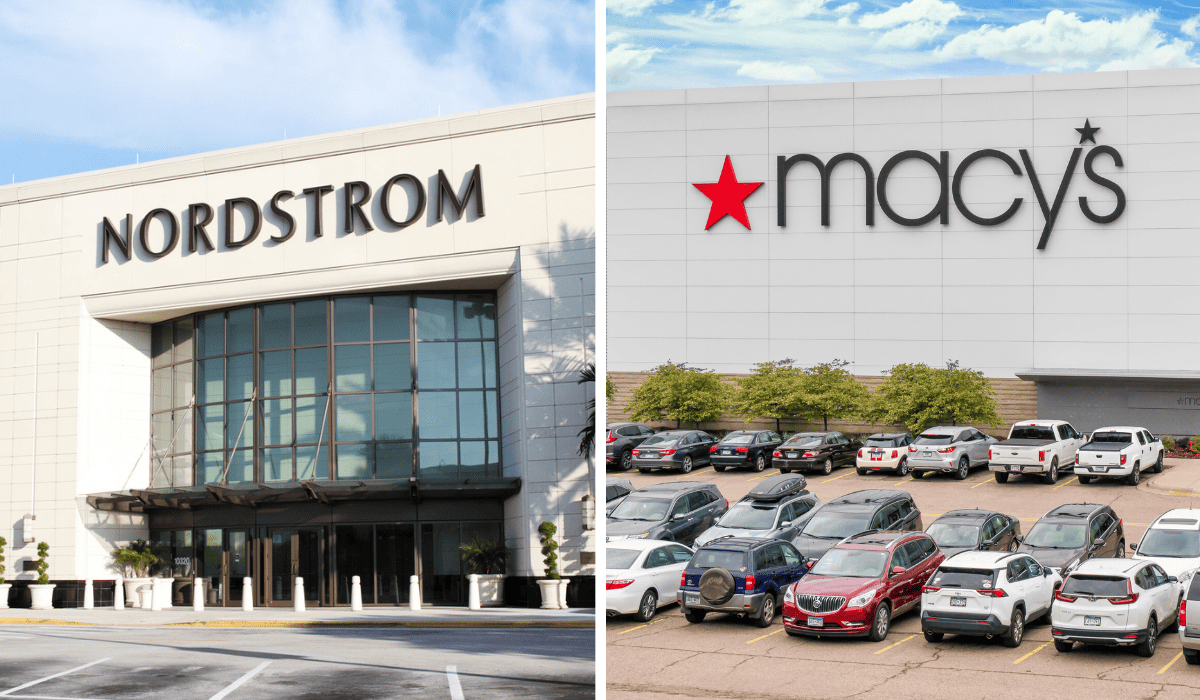
iStock.com/NoDerog | iStock.com/Wolterk
Retail Giants Nordstrom and Macy’s Consider Private Ownership
In a move set to drastically shake up the American retail landscape, major department store chains Nordstrom and Macy’s could soon find themselves under the ownership of private equity firms or hedge funds. This potential shift marks a departure from the traditional retail model and hints at significant transformations in the industry.
Recent data from Dealogic reveals a notable trend: Investments in retail and consumer companies accounted for only 7% of the total U.S. private equity deal volume ($2.6 trillion) over the past decade. However, deals involving retail giants could reverse this trend, sparking renewed interest in private ownership of major U.S. retailers.
One such example is Nordstrom, where the founding family is eyeing a bid to take the company private. The move stems from a desire to retain control over the chain while alleviating the pressure of quarterly performance evaluations, allowing the company space to strategize effectively.
Nordstrom’s expansion plans, particularly through its discount-focused sister chain Rack, underscore its commitment to growth. In contrast, competitors like Macy’s are pivoting toward a different strategy, focusing on the expansion of its upscale brands Bloomingdale’s and Bluemercury.
The retail landscape is fraught with challenges, including subdued consumer demand and intense competition from off-price retailers like Burlington and TJX Companies. Nordstrom’s push into its discount Rack business aims to capture a broader market while diversifying its presence beyond traditional mall locations.
Despite successes in certain areas, challenges persist for Nordstrom, particularly in balancing inventory and attracting shoppers across its different segments. However, strategic adjustments, such as incorporating well-known brands into its Rack assortment, indicate a commitment to meeting customer demands.
Meanwhile, Macy’s is navigating a different path, facing an unsolicited bid from investment firms Arkhouse and Brigade Capital. This Tuesday, around two weeks after the firms raised their initial offer, Macy’s told Reuters that “it will open its books to Arkhouse and Brigade Capital, a potential breakthrough in the investment firms’ $6.6 billion bid to take the U.S. department store operator private.”
The major difference between Nordstrom and Macy’s, according to Reuters’ sources, is that “while the Nordstrom family is pushing for private ownership, Macy’s faces an unsolicited hostile bid. And because Macy’s is a better operator with less leverage than Nordstrom, it’s easier to finance.”
The goal of going private is often to reposition the business for future sale, leveraging improved market conditions. Macy’s could potentially return to public markets in a different form, balancing short- and long-term goals. Robert Burke, a luxury retail analyst, believes going private will provide Macy’s the time it needs to adapt to the evolving retail landscape.
Shielded from quarterly earnings analysis, private companies can focus on creating shareholder value through avenues beyond just driving profitable growth. Real estate value becomes a primary focus, offering a different perspective on shareholder value creation.
The trend toward going private reflects a soft public market, according to Neil Saunders, managing director of GlobalData, where valuations are cautious and investor sentiment is pessimistic. Multibrand retailers must weigh their options: risk undervaluation by staying public, or “go private for a lower price.”
Saunders added that public pressure can be beneficial because “it forces multibrand retailers to be disciplined and have a clear strategy.” He also highlighted the fact that “investors taking business private are often focused more on financials and maximizing returns than they are on trading. That does not always bode well for the long-term health of a retailer.”
Whether for Nordstrom, Macy’s, or another retailer, going private may offer the opportunity to navigate challenging market conditions and focus on long-term value conditions, but the decision ultimately depends on the company’s strategic goals and its assessment of market conditions.
Discussion Questions
How might the shift to private ownership of major retail chains like Nordstrom and Macy’s redefine the metrics of success in the retail industry, moving beyond short-term performance to prioritize long-term sustainability and shareholder value?
Amid subdued consumer demand and fierce competition, how do Nordstrom and Macy’s differing strategies reflect changing consumer preferences and the evolving retail landscape?
As multibrand retailers weigh the advantages of going private to escape public market pressures, how can they balance short-term gains with the imperative to invest in innovation, customer experience, and long-term growth to stay competitive?
